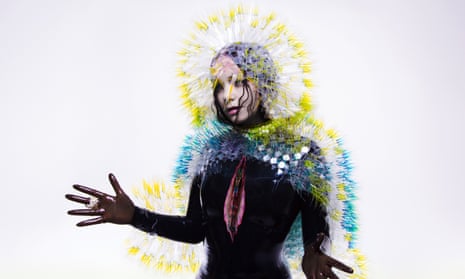Her reputation is such that you might imagine an average Sunday afternoon for Björk to involve feeding goji berries to a rare Cuban greater funnel-eared bat with one hand, while completing a 1000-piece Antarctic ice sheet jigsaw puzzle with the other. It was an odd experience, then, when months before the release of Vulnicura, I saw the supreme celestial being strolling past Tescos on Bethnal Green high street, brow furrowed, fingers jabbing at an iPhone. She could almost have passed for an average 50-year-old woman, on her way for a cheeky Nando’s.
The sighting was a timely reminder of the actual Björk Guðmundsdóttir – mother and mere mortal. The Icelandic musician’s ninth studio LP broke a three-album run of conceptual, esoteric records centred around nature, politics and technology. Instead, it chronicled the gruelling aftermath of her marriage breakdown, “the most painful thing” she had ever experienced. Confronting her feelings, she began to write for strings, becoming a “violin nerd”, and articulating her heartache in harrowingly expressive compositions.
Of course, to settle for the theatrics of strings might seem hackneyed for an artist so future-facing. Which is why, on Vulnicura, Björk punctured these lush arrangements with mechanical beats – Black Lake, for example, began with mournful violins before her grief is pulverised by a sledgehammer sound that emulates both an aching head and a pounding heart. Much like the production on 1997’s Homogenic, the synergy of electronics and acoustic instruments on this album is unsettling but ultimately cathartic.
In spite of her supposed otherworldliness, Björk has always had an unvarnished way with words, especially with regards to romance. Take Possibly Maybe’s confessional “I suck my tongue in remembrance of you,” or Venus as A Boy’s observation that his “wicked sense of humour suggests exciting sex”. On Vulnicura, she went so far that her lyrics provided a bizarre predicament for fans. At times her pain was so candidly expressed it bordered on unlistenable, like during her solemn recalling of “every single fuck we had together” on History of Touches. Earlier, on Lionsong, she despondently hoped that “maybe he will come out of this loving me” and, on the nightmarishly brutal Family, asked: “Is there a place where I can pay respects for the death of my family?”
No Björk album would be complete without some involvement of the astral, though, and as the record concludes, she seeks solace in the stars: “I am fine tuning my soul to the universal wavelength/No one is a lover alone,” she sings on the Antony Hegarty duet Atom Dance. Björk understands that after every tragedy there is a restored perspective in the world. There is light at the end of the tunnel. And there is incredible music to be made.

Comments (…)
Sign in or create your Guardian account to join the discussion